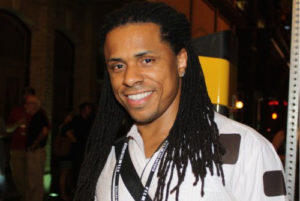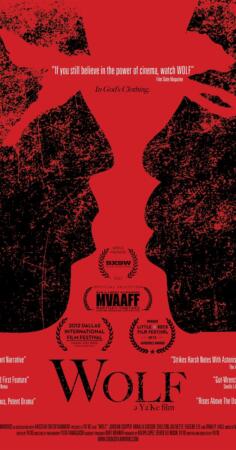It’s been a few years since Ya’Ke Smith’s impressive feature film debut, “Wolf,” made its world premiere at the SXSW Film Festival (this was in 2012). The film never received a proper official theatrical release in the USA after its film festival life, which I think is unfortunate, because it’s a film that deserved a big screen release.
Despite critical acclaim during its film festival tour, the film didn’t immediately attract distributors, like so many other challenging films (especially those made by black filmmakers), likely because few knew what to do with it, and may have been scared off by the film’s controversial subject matter. It was eventually picked up however and released on various home video platforms 2 years after its initial premiere (in 20140); and there’s a story to be told about that entire ordeal, but it’s not my place to tell it.
I just want to let you know that, as I just found out, the film is now available on Amazon Prime, which means if you have a Prime membership, you can watch it right now at no extra cost. If you don’t have an Amazon Prime membership, you can rent it (for $2.99) or buy it (for $9.99) to stream via Amazon Video. It’s apparently still not available for purchase on DVD or BluRay. It’s also not available on Netflix. But it is on various other VOD platforms like iTunes, Google Play, and more. So you’ve got options.
It’s a film I raved about 4 years ago, when I first screened it, and I think it’s one that not enough people have seen, but should. So, check it out this weekend if you can.
Below you’ll find my initial review after the film’s SXSW world premiere in 2012:

The cinematic punch in the gut I so desperately needed before leaving SXSW and Austin, TX tomorrow morning, Ya’ke Smith’s feature film directorial debut “Wolf” is an audacious, potent drama that will likely elicit extreme reactions from viewers when it’s eventually in general release – reactions that will undoubtedly lead to fiery discussion centered around the central themes the film tackles.
This is the film that Spike Lee’s “Red Hook Summer” should have been; and if Tyler Perry had the goods and the guts, his Christian-themed morality tales that seem to only exist on a really simplistic, even shallow level, will instead look and sound like “Wolf.”
Those comparisons should give you some idea of what the taboo topic is that is the focus of this film’s narrative.
“Wolf” stars Irma P. Hall, Mikala Gibson, Jordan Cooper, Shelton Jolivette, and Eugene Lee in a story about a family shaken to the core when they discover their son has been molested. As they struggle to deal with the betrayal, their son heads towards a total mental collapse because of his love for his abuser, while his abuser attempts to exorcise his own past demons.
Director Smith attacks the film’s themes with an unflinching, non-exploitative honesty; it’s raw, gritty, tragic, but also oddly beautiful material, thanks in part to cinematographer Yuta Yamaguchi’s striking visual work here, as well as Smith’s visual metaphors (especially how he chose to represent the ideas suggested by the film’s title – as in, a wolf in sheep’s clothing), and the vulnerability the actors, we could say, celebrate in their wonderful performances.
You will be engrossed within the film’s first 45 minutes or so, as characters are introduced, and relationships are mostly established, and as director Smith withholds just enough information to keep you curious and a bit on edge, wondering where this particular journey will lead.
Throw in some simple, yet clever sound design work, and the suspense is heightened even further. Throughout the film, there’s this unsettling and unrelenting, low-pitched hum that rises and falls, crescendo and decrescendo – sometimes instantly, others, gradually – that really works as a tension builder, but also, it’s like a constant reminder, even when it’s reduced to near-silence, of something ominous lurking within the film’s layers; something that could at any minute explode.
And that, in a nutshell, describes the film’s central character, played convincingly by Jordan Cooper, who demonstrates a range of emotions here, though it’s what I’d call a mostly internal performance, because the character actually doesn’t speak very much, which only ratchets up anxiety over the unexpected; we just don’t really know what this kid is going to do next. Clearly he’s been severely psychologically injured by the many years of abuse he’s suffered, and thus what might seem to be irrationality on his part needs to be regarded within that specific context in order to make sense of any of it.
He’s essentially the equivalent of a walking time bomb, and director Smith proposes that this kind of *threat,* if left uninhibited, will likely lead to the creation of other walking time bombs.
As if tackling the issue of child molestation by a man of the cloth on film wasn’t already daring enough, director Smith reaches even further and does something that films of this nature mostly shun, and that is he actually humanizes the molester. The Bishop, as he’s called, isn’t some 1-dimensional cutout; he isn’t kept at a distance from us. Instead, we actually get to know him quite intimately, and eventually learn of what’s at the root of his own illness. Some in the audience might even, dare I say, start to empathize with the Bishop. As I said, it’s going to be one of those heavily debated movies whenever it’s eventually released; and this, I think, is one of many reasons why.
Not that the film in any way suggest that the crime against humanity the Bishop commits is in any way to be condoned; the point is that the main characters in the film are all well-defined and rounded – including the one that most will immediately label as demon.
But this also serves to give the film some balance, if you will; it’s not a sermon; it’s not entirely biased or one-sided; I wouldn’t reduce the film to a single sentence, calling it a critique of the church/religion – in this specific case, the “black church.”
We could say it goes out of its way to present all sides of a single “argument,” and that’s something that makes it all the more interesting, given what that “argument” is. Essentially, you will be challenged after spending close to 2 hours with this close-knit group of characters who simply can’t be reductively categorized as “good” or “bad”; there are shades here, and Smith doesn’t make it easy for the viewer, which is a very good thing in my opinion. It just makes for a much more stimulating viewing experience – the punch in the gut I mentioned in the first sentence of this review.
A family is unraveled by a trusted figure’s terrible betrayal, and as you’d expect, that duplicity leads them to question the principles of this particular pillar of the society they are a part of, and the institution he belongs to also starts to come undone, as a once quiet, seemingly peaceful community will never quite be what it thought it was before.
So even though central characters appear to have experienced some form of catharsis, and it’s suggested in the end that justice will indeed be served, nobody really wins here (if only it were all just that simple), and the film’s ending sequences (thinking again of director Smith’s filmic interpretation of the film’s title) put an exclamation mark on that point!
Congrats to Ya’ke Smith on an ambitious first feature effort. Let’s hope it gets picked up; the discussions that will follow after others have seen it should be, if anything, searing, and I’m most certainly looking forward to that!
Watch the trailer and then go check out the film on Amazon’s streaming service:


